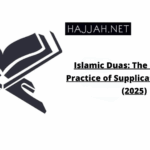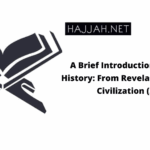HAJJAH.NET – Harnessing the Healing Power of Dua | Dua, an Arabic word meaning supplication or invocation, holds significant importance in the Islamic faith. Muslims believe that dua is a means of connecting with Allah (God) and seeking His blessings, guidance, and healing. It is a form of communication through which believers express their deepest desires, concerns, and gratitude to the Almighty. Harnessing the healing power of dua can bring solace, comfort, and spiritual strength during challenging times. In this article, we will explore the concept of dua and delve into its immense potential to bring healing and tranquility to individuals.
1. Introduction: Understanding Dua
Dua, in its essence, is a heartfelt conversation with Allah. It goes beyond reciting prescribed prayers and involves a sincere connection with the Creator. Muslims believe that Allah is all-knowing, all-merciful, and the ultimate source of healing and guidance. Through dua, believers seek His blessings and request relief from physical, emotional, and spiritual ailments.
2. The Spiritual Significance of Dua
Dua holds immense spiritual significance in Islam. It is an act of humility, acknowledging human dependency on the divine. Muslims are encouraged to turn to Allah in all matters of their lives, recognizing that He alone has the power to grant healing and alleviate suffering. Dua strengthens the bond between the Creator and His creation, fostering a sense of closeness and reliance on Allah’s infinite mercy.
Also Read
3. Dua as a Source of Inner Peace
In times of distress, dua serves as a refuge for the troubled soul. It provides solace and peace by unburdening one’s worries and seeking divine intervention. The act of turning to Allah in prayer helps individuals find inner tranquility, knowing that their concerns are heard and understood by the Most Compassionate.
4. The Role of Dua in Physical and Emotional Healing
Dua is not limited to seeking spiritual solace; it also has the potential to bring about physical and emotional healing. Muslims believe that Allah has the power to cure ailments and grant well-being. By sincerely invoking Allah’s healing mercy through dua, individuals open themselves to the possibility of recovery and restoration.
5. Harnessing the Power of Dua for Personal Growth
Dua is not solely reserved for times of distress. It is a means of seeking personal growth and improvement. Through supplication, individuals can ask Allah for wisdom, strength, and guidance in their endeavors. Dua becomes a powerful tool for self-reflection, motivation, and achieving one’s goals with the help of divine blessings.
6. Dua as a Means of Seeking Forgiveness
Seeking forgiveness is an integral part of dua. Muslims recognize their imperfections and turn to Allah for forgiveness and mercy. By sincerely repenting and asking for forgiveness, individuals purify their souls and experience a sense of liberation from the burden of past mistakes. Dua enables believers to seek Allah’s forgiveness and start anew.
7. The Science behind Dua and Its Effects on the Mind and Body
Scientific research has begun to explore the effects of prayer and meditation on the human mind and body. Studies have shown that engaging in spiritual practices, such as dua, can reduce stress, promote emotional well-being, and enhance overall health. Dua, with its meditative and reflective nature, has the potential to positively influence mental and physical well-being.
8. The Etiquette of Making Dua
Making dua is an act that requires sincerity, humility, and reverence. Muslims follow certain etiquette when making dua, such as facing the qibla (direction of the Kaaba in Mecca), raising hands in supplication, and choosing appropriate times and occasions for prayer. Adhering to these etiquettes enhances the spiritual connection and focus during dua.
9. Steps to Strengthen Your Dua Practice
To strengthen one’s dua practice, individuals can take several steps. These include increasing personal devotion, seeking knowledge about the appropriate prayers and supplications, making dua in times of ease and hardship, and persisting in supplication with patience and trust in Allah’s plan. Strengthening one’s relationship with Allah deepens the impact and effectiveness of dua.
10. Examples of Powerful Duas for Healing and Well-being
There are numerous duas mentioned in the Islamic tradition that are specifically recited for healing and well-being. Some examples include the Dua for Healing (Ruqyah), the Dua of Prophet Yunus (Jonah), and the Dua for Ease and Relief (Dua al-Faraj). These prayers serve as powerful tools for seeking Allah’s intervention in times of distress.
11. Stories of Healing through Dua
Throughout history, there have been countless stories of individuals who have experienced healing through the power of dua. These narratives highlight the profound impact of sincere supplication and the transformative effects it can have on one’s life. Such stories serve as inspiration and encouragement for believers to embrace the healing power of dua.
12. Cultivating Patience and Trust in the Healing Process
Healing is a process that requires patience and trust in Allah’s wisdom. Muslims understand that the answer to their dua may come in different forms and at different times. Cultivating patience and trusting in Allah’s plan is essential for maintaining faith and resilience throughout the healing journey.
13. Conclusion
Dua is a spiritual practice that harnesses the healing power of prayer and supplication. It serves as a means of connecting with Allah, seeking His blessings, and finding solace in times of distress. Dua has the potential to bring about physical, emotional, and spiritual healing, while also fostering personal growth and strengthening one’s relationship with the Creator.






